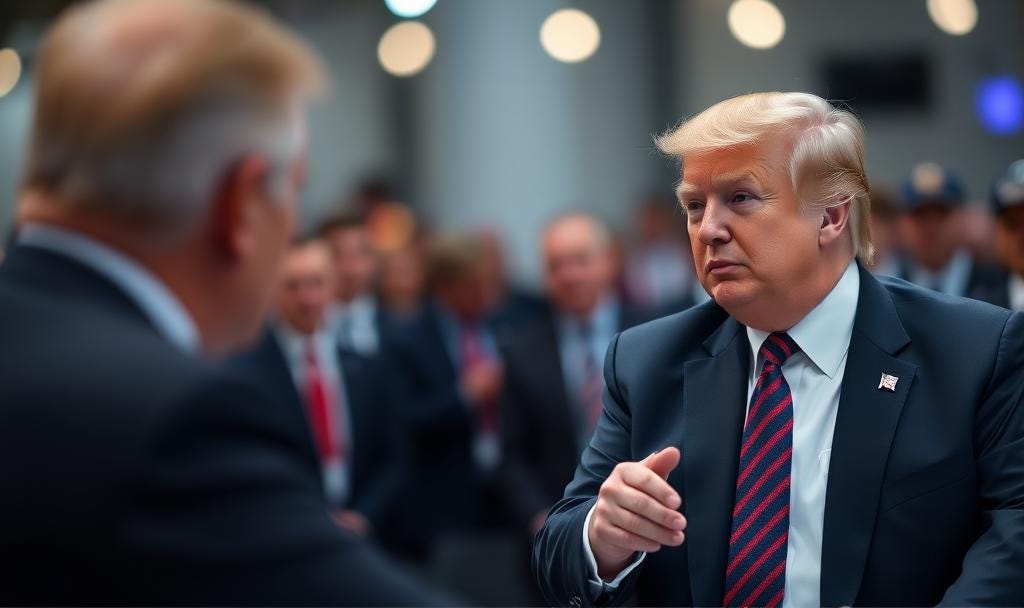Elon Musk Makes Direct Appeals to Trump to Reverse Sweeping Tariffs Amid Escalating Trade Conflict
Elon Musk, CEO of Tesla and SpaceX, has personally appealed to President Donald Trump to reverse sweeping tariffs that have sent shockwaves through global markets and disrupted supply chains. Over the weekend, Musk reached out directly to Trump, bypassing his trade adviser Peter Navarro, to mitigate the economic fallout from the administration's aggressive trade policies. Despite Musk’s intervention, Trump doubled down on his tariff strategy, warning of a potential 50% tariff increase on Chinese imports on Monday, following the 34% tariffs announced last week. The conflict marks a significant rift between Musk and Trump, who have previously aligned on key policy initiatives.
Musk’s Push for Free Trade
Musk’s appeals included public criticism of Navarro and calls for a “zero-tariff scenario” between the United States and Europe. Speaking at a conference in Florence with Italy’s Deputy Prime Minister Matteo Salvini, Musk advocated for free trade agreements that would eliminate tariffs. “At the end of the day, I hope it’s agreed that both Europe and the United States should move ideally, in my view, to a zero-tariff situation,” Musk stated during the event.
On social media platform X (formerly Twitter), Musk shared a video featuring economist Milton Friedman emphasizing the benefits of international trade cooperation. He also criticized Navarro’s academic background, posting: “A PhD in Econ from Harvard is a bad thing, not a good thing.”
Musk’s stance reflects concerns about how tariffs could impact Tesla and other tech companies reliant on global supply chains. Tesla manufactures vehicles in China and the U.S., making it particularly vulnerable to protectionist policies. “The tariff impact on Tesla is still significant,” Musk acknowledged in a recent post.
Trump’s Tariff Strategy Sparks Global Turmoil
President Trump’s sweeping tariff plan includes baseline 10% levies on imports from all nations, with higher rates targeting specific countries such as China (34%), India (26%), and the European Union (20%). The tariffs are part of Trump’s broader economic agenda to reshape global trade dynamics and reduce reliance on foreign imports.
Speaking aboard Air Force One on Sunday, Trump described the tariffs as “medicine” necessary to address trade imbalances. “I don’t desire anything to decline. But occasionally, medicine is necessary to remedy an issue,” he remarked.
Trump has shown limited willingness to negotiate tariff reductions unless foreign governments provide significant compensation. “They wish to negotiate, but discussions won’t occur unless they compensate us significantly annually,” he asserted.
Economic Fallout and Market Reaction
The tariffs have triggered widespread economic concerns, with experts warning of potential inflationary pressures and recessionary risks. Harry Holzer, senior fellow at Brookings Institution, predicted that U.S. job losses could reach millions if the tariffs remain in place long-term. Economists estimate that unemployment rates could rise to recession-like levels as businesses struggle with increased costs.
The stock market has already felt the impact of Trump’s tariff strategy. The S&P 500 dropped by 19% from its February peak, marking its worst performance since the COVID-19 pandemic crash in 2020. Major tech companies like Apple, Amazon, Nvidia, and Meta experienced steep declines in stock value—Apple alone lost over $300 billion in market capitalization.
Tesla has been particularly affected by the tariffs and market turmoil. Its stock price has fallen by over 42% since January 2025, reflecting broader challenges faced by tech firms reliant on international trade.
Musk vs Navarro: A Divided Administration
Musk’s criticism of Peter Navarro highlights trade policy tensions within Trump’s administration. Navarro has been a staunch advocate for protectionist measures, dismissing Musk’s calls for free trade as self-serving. “What’s crucial to recognize about Elon is that he sells cars. That’s his primary focus,” Navarro commented during a Fox News interview.
The clash between Musk and Navarro has fueled speculation about growing divisions within Trump’s team. While Musk remains one of Trump’s prominent supporters—having contributed nearly $290 million to Republican campaigns—his opposition to key aspects of Trump’s economic agenda signals potential fractures in their alliance.
Industry Concerns Over Retaliatory Tariffs
Trade analysts warn that U.S. tariffs could prompt retaliatory measures from other countries, further exacerbating economic instability. European Commission President Ursula von der Leyen hinted at targeting U.S.-based digital services as part of Europe’s response to Trump’s tariffs. France and Germany have expressed similar intentions to impose countermeasures aimed at Silicon Valley giants like Meta, Alphabet, Apple, Microsoft, and Amazon.
Tesla itself cautioned against retaliatory actions in an unsigned letter addressed to U.S. Trade Representative Jamie Greer last month. The company noted that previous trade actions by the U.S. led to swift reactions from targeted countries, including higher tariffs on electric vehicles imported into those markets.
Broader Implications for Global Trade
Trump’s tariff strategy is poised to reshape global supply chains and disrupt industries dependent on international commerce. Apple faces potential price hikes of up to 40% for its iPhones due to its production reliance on China, a major target of Trump’s tariffs. Similarly, Amazon relies heavily on third-party vendors from China for its e-commerce operations.
The tech industry is bracing for further challenges as retaliatory measures loom and supply chain disruptions intensify. Analysts predict that semiconductor production hubs like Taiwan could face additional punitive measures under Trump’s tariff framework.
Looking Ahead: Uncertain Path Forward
As tensions escalate between Musk and Trump over trade policy, the future remains uncertain for both global markets and U.S.-China relations. While Musk continues to advocate for free trade solutions and reduced barriers, Trump appears committed to his protectionist agenda despite criticism from business leaders and economists.
The conflict underscores broader questions about the long-term viability of aggressive tariff strategies in an interconnected global economy. Whether Musk’s appeals will influence Trump or lead to policy shifts remains unclear, but their divergence highlights growing challenges within an administration navigating complex economic landscapes amid escalating trade conflicts.



